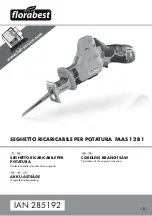
1
English
GB
FR
DE
ES
IT
NL
PT
DK
SE
FI
NO
RU
PL
CZ
HU
RO
LV
LT
EE
HR
SI
SK
GR
TR
SPECIAL RULES
Q
PROTECT YOUR LUNGS.
Wear a dust mask if
operation is dusty.
Q
Hold power tool by insulated gripping surfaces,
when performing an operation where the cutting
accessory may contact hidden wiring or its own
cord.
Cutting accessory contacting a "live" wire may
make exposed metal parts of the power tool "live" and
could give the operator an electric shock.
SPECIFICATION
Voltage 230V
50Hz
Input
800 W
Stroke per minute
0-2800 min
-1
Length of stroke
3 cm
Cutting Capacity (Wood)
75 mm
Net weight
2.9 kg
DESCRIPTION
1. Variable speed dial
2. Trigger switch
3. Shoe assembly
4. Blade
5. Blade clamp Lock / Release level
OPERATION
WARNING
Always wear safety goggles or safety glasses
with side shields when operating this tool.
Failure to do so could result in dust, shavings,
or loose particles being thrown into your eyes,
resulting in possible serious injury.
TURNING THE SAW ON/OFF (Fig. 2)
Follow these directions to turn the saw on and off:
Q
To turn the saw on: Depress the switch trigger.
Q
To turn the saw off: Release the switch trigger.
ADJUSTING THE SPEED (Fig. 3)
The variable speed feature allows the saw to operate at
speeds that can be increased by rotating the dial from
1 to 6. The dial is conveniently located on the handle,
allowing operator control of blade speed.
Follow these directions to adjust the speed:
Q
To increase the speed (H): Turn the dial to a higher
setting.
Q
To decrease the speed (L): Turn the dial to a lower
setting.
SELECTING BLADES
Selecting the correct type of blade is important in order
to obtain the best performance from your saw. Select
the blade based on the application and on the material
you wish to cut. Selecting the right blade will give you
a smoother, faster cut and prolong the life of the blade.
Blades with fewer teeth, 10 teeth per inch (TPI) are typically
used for cutting wood, while blades with more teeth are
better for cutting metal or plastic. We recommend 14 TPI
for plastics and soft metals and 18 TPI for hard metals.
INSTALLING BLADES
The toolless blade change system eliminates the need
for tools when changing the blade.
WARNING
Failure to unplug the tool could result in accidental
starting causing possible serious injury.
Follow these directions to install blades (Fig. 4):
Q
Unplug the saw.
Q
Lift the blade release lever.
Q
Insert the blade fully, tooth side down.
Q
Lower the blade release lever.
OPERATING THE SAW (Fig. 5)
Follow these directions to operate the saw:
Q
Secure the workpiece to a work bench or table with a
vise or with clamps.
Q
Make sure the saw blade is clear of any foreign
material and that the power cord and extension cord
are out of the blade path.
Q
Hold the saw firmly in front of and clearly away from
you.
Q
Mark the line of cut clearly.
Q
Depress the trigger switch to start the cutting action.
Q
Set the base assembly against the workpiece.
Move the blade into the workpiece.
NOTE:
Do not force. Use only enough pressure to keep
the saw cutting. Let the blade and saw do the work.
Keep pressure on the base, against the workpiece.
Summary of Contents for ERS-80V
Page 2: ...1...























